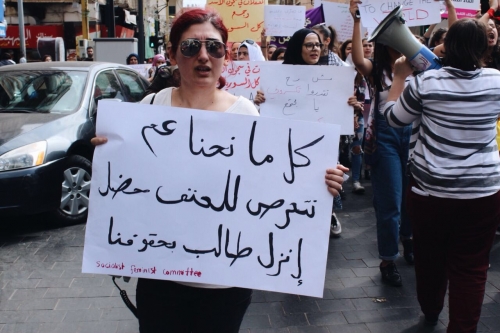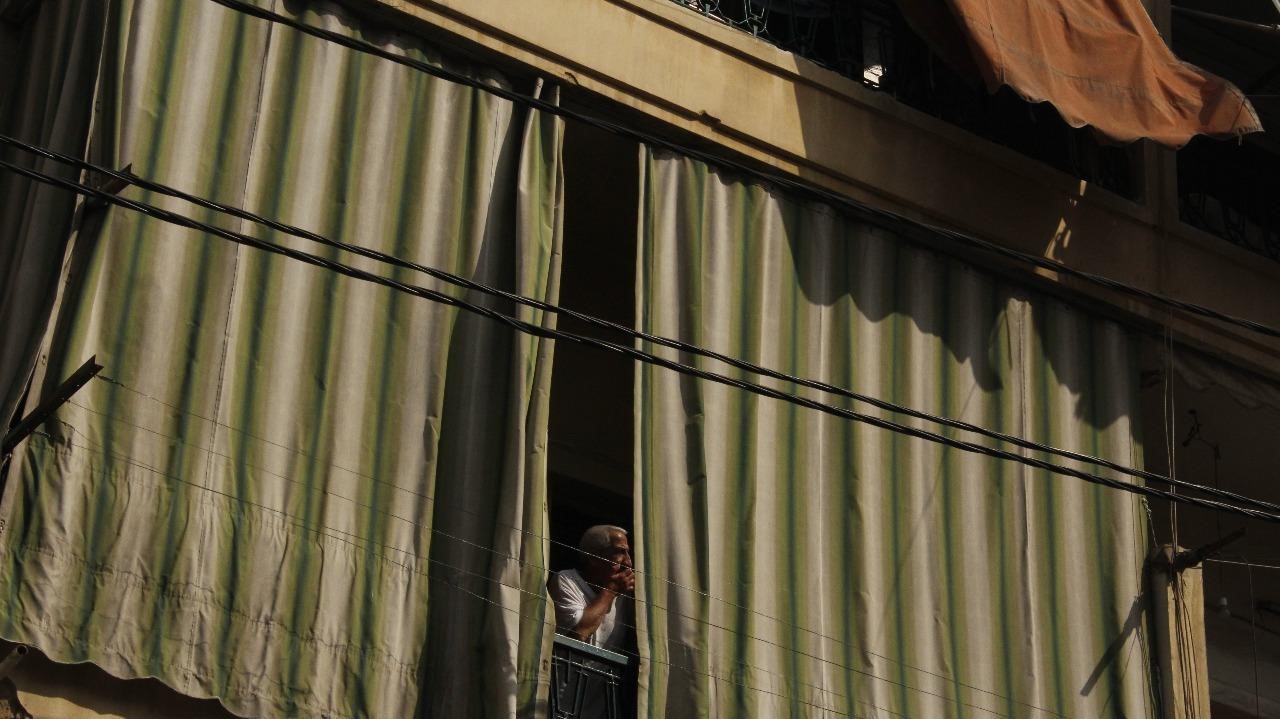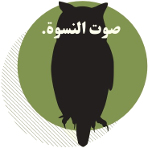
The feminist movement in Lebanon can be described as diverse, complex, and filled with and encompassing all the issues women face under patriarchy in Lebanon, with a strong feeling of solidarity. ‘Every struggle is priority and solidarity is the solution.’[1]
When reflecting on the IWD march this year, a few things come to mind: The march itself and how we chose to do a march this year as there are other ways to recognize and “celebrate” International Women’s Day (IWD). But also how we chose the route of the march. Working for the second time with the Feminist Bloc and for the first time with the older more established women’s organizations, who are not necessarily and sometimes far from being feminist. Noting the dichotomy between the two types of organizations, especially with those aspiring to be established, within the Feminist Bloc. Organizing as both radical, feminist, grassroots, volunteers and paid workers of an established women’s organizations, and the effect this had on the day and the division of work that played out in the process of organising. On a more positive note, the visibility at the march of the more marginalized women in our communities, transwomen, and domestic workers, and the feedback of Syrian comrades of a feeling of solidarity and belonging at the march, as we chanted down with the Assad regime and all regimes who oppress us, as people, as women. Finally, I am reminded of the triggers and emotions I felt the day of the March and how this day allowed me to begin my recovery having survived years of domestic violence and child abuse, beginning my recovery after 19 years of its first occurrence in my memory, memories I had blocked out for so long, memories I believed no longer existed, I believed didn’t happen. Highlighting, how from when we enter this world until we leave, we as women are subject to the violence of this patriarchal system that we must navigate to survive, that connects us and our struggles, and that we must work together to dismantle. “So long as we continue to face violence, we will continue to fight for our rights.”[2]

To march or not to march? This was the first question, of which many other ideas to recognize IWD were suggested, including standing in front of the houses of domestic violence victims, those who paid with their lives, those who did not survive, those who never received justice as the system continues to kill, and the killers continue to walk free. A march we agreed, a march to combine the work of both blocs,[3] a march for visibility: we exist and we are fighting. The meeting to decide the route was long and tiresome. It was difficult to argue with women we have only just began working with, the way of debating became patriarchal as our modes of debate changed, with many women feeling the need to cut others off as they spoke, or responding after every speaker, occupying more space than the rest us. This was most visible with the juxtaposition between Feminist Bloc meetings and the larger IWD organizing meetings, most felt by the moderators, whereby in the latter this job was more tiresome. And so from two route options we chose the one that both blocs would agree to. The route was chosen to be inclusive, the day and time to be inclusive, and we began in Adlieh, near the prison, beside the bridge that holds many brown foreigners, domestic workers, unlawfully under arrest underneath it. We passed by the urban areas of Barbir and Basta as we saw the support of those who could not join us, as they threw rice from their balconies, we saw the unease of men as they watched while they prevented the females members in the household from doing the same.[4] We ended in a public park in Beirut, one of the few public spaces in this city. We were many, we were loud, and we were in blocs, in solidarity.
 The juxtaposition between the blocs was not only felt in the modes of debate, but in the topics discussed. In the aim to work together, to show a strong, albeit large women’s/feminist movement through a visible march, we focused on logistics, and failed to discuss politics, or at least not in detail, politics regarding our stances and strategies when it comes to the feminist struggle in Lebanon, beyond the organization of one march. This failure to discuss politics cost us time, and a valuable opportunity, and I would argue a large proportion of the time spent on making various logistical decisions was in part due to our failure to discuss politics early on. For example the decision for organisations to only have their names, not their logos on one banner, of no more than 2 by 1 meter, was put in place to ensure visibility and diversity of the various organisations working on the women’s/feminist movement in Lebanon, and to challenge any appearance of universality which for myself and I believe the current feminist organisations, is counterproductive and has the potential to be exclusionary, and non intersectional. Based on experience, when movements tend to appear universal, or mainstream, it is largely because they are non-threatening, and therefore fail to highlight and make visible the complexities of the struggle and the varying experiences of those different groups who experience patriarchy differently, due to race, class, sexual orientation, and others. Had we discussed politics and the movement rather the banners from a logistical standpoint, this discussion would not only have been more fruitful, but its application would have been respected. This was discussed from a political standpoint by some attendees, but only on the surface and only regarding the specific logistical topic at hand. There was too much of a focus on reaching an agreement so that we can “move on” as if we were working on some imaginary work plan and had to answer to donors and funders that didn’t exist, and the meetings began to feel more like a design meeting of any NGO funded program. Ironically all the logistics meetings did not equate to an equal distribution of tasks, and did not prevent all the work from being placed on the Feminist Bloc. We missed an opportunity to discuss politics and truly learn from each other, and change the women’s/feminist movement into a unified diverse feminist movement.
The juxtaposition between the blocs was not only felt in the modes of debate, but in the topics discussed. In the aim to work together, to show a strong, albeit large women’s/feminist movement through a visible march, we focused on logistics, and failed to discuss politics, or at least not in detail, politics regarding our stances and strategies when it comes to the feminist struggle in Lebanon, beyond the organization of one march. This failure to discuss politics cost us time, and a valuable opportunity, and I would argue a large proportion of the time spent on making various logistical decisions was in part due to our failure to discuss politics early on. For example the decision for organisations to only have their names, not their logos on one banner, of no more than 2 by 1 meter, was put in place to ensure visibility and diversity of the various organisations working on the women’s/feminist movement in Lebanon, and to challenge any appearance of universality which for myself and I believe the current feminist organisations, is counterproductive and has the potential to be exclusionary, and non intersectional. Based on experience, when movements tend to appear universal, or mainstream, it is largely because they are non-threatening, and therefore fail to highlight and make visible the complexities of the struggle and the varying experiences of those different groups who experience patriarchy differently, due to race, class, sexual orientation, and others. Had we discussed politics and the movement rather the banners from a logistical standpoint, this discussion would not only have been more fruitful, but its application would have been respected. This was discussed from a political standpoint by some attendees, but only on the surface and only regarding the specific logistical topic at hand. There was too much of a focus on reaching an agreement so that we can “move on” as if we were working on some imaginary work plan and had to answer to donors and funders that didn’t exist, and the meetings began to feel more like a design meeting of any NGO funded program. Ironically all the logistics meetings did not equate to an equal distribution of tasks, and did not prevent all the work from being placed on the Feminist Bloc. We missed an opportunity to discuss politics and truly learn from each other, and change the women’s/feminist movement into a unified diverse feminist movement.
During the week leading up to the march, we were confronted by transphobic and sexist opinions by a representative of the General Women’s Assembly on national television, and were scorned by the leadership of this organization for demanding these views are violent and contradictory of our work, and for asking them to leave the IWD organising organisations. We missed an opportunity to discuss politics and make the movement larger, by addressing these topics with the various organisations early on. Our approach remained different, as activists, despite a large number of us working for NGOs as a form of paid employment, because we were volunteers, and our aim was not linked to funds. One of the first decisions taken was that as IWD organisers would not accept external funding, something the Feminist Bloc pushed for, highlighting our refusal of funders and their interests. The Socialist Feminist Committee[5] a member of the Feminist Bloc organised a fundraiser for the march, this further allowed us to be autonomous and independent in our organising, and had provided the women in the other bloc an opportunity to work differently, which they did not take. The fundraiser itself displayed a different approach to the general fundraisers hosted in Lebanon, in that it was financially accessible to all, and in it being a feminist comedy/poetry night, it allowed a holistic approach that included political discussions, while raising funds.
On the day of the march, despite the debate that took place on banners and logos, we had organizations who were part of the organizing committee come with logos that were the size of the dimensions we put for the banners. Logos so large, the pictures taken from on top of the bridge, when we were marching from under it, were the only logos and names visible, as if to display there were the only organising organizations. The majority of the work was done by the Feminist Bloc, as the other organisations attended under their banners. Some organisations even left, after creating physical space between them and the other attendees, refusing to actively participate in the march, and requesting chanters to chant away from them, so that the attendees they invited do not participate in our chants. And so Abaad left, arguing that fighting the patriarchy is exclusionary of men, thinking of their donors and patrons, thinking as an NGO does, with work plans, logistics and kick off meetings, rushing to agree on the surface so that we can launch the march, as we launch humanitarian programs. Not only was the logistics work of the day on us, but in purposefully slowing down their group they increased our workload as we kept attempting to keep all attendees together, as anyone who has worked in crowd control knows, this is no easy task. In failing to discuss politics we missed an opportunity to learn from each other, and learn our politics are different, and that therefore our work together will always be limited, as our rights are not given to us, nor do we achieve their recognition through the negotiation with the state, but by demanding and taking them. Yet I still hope that over the course of this year, based on this experience we would open the space for debates between us.
On the day of the march we marched in blocs,[6] with a common anger, in solidarity, displaying the diversity and feminisms of the movement, recognizing we are many, and we are different. And then I wonder is the visibility of different blocs, different struggles and our solidarity enough to make the movement inclusive? Is this what is lacking? In the women’s movement definitely, as attendees claimed chants focusing on the Syrian and Palestinian women’s struggle, were putting the Lebanese aside.
For the feminist movement in Lebanon, I ask the question: is solidarity enough?
For the march at least and the members organising it, this process was inclusive, and the presence of the most marginalised women in Lebanon was visible. Transwomen are women, and they were visible and loud at the march. Domestic work is work, and domestic workers are people, and they were visible and loud at the march. These feminist issues were at the forefront and we chanted for revolution, in solidarity with each other, with rainbow flags and Palestinian flags waving high during the march, and flags of the global south countries the Lebanese labor market exploits, and chants calling for the downfall of the Assad regime, the downfall of the kafala[7] system, and the downfall of patriarchy. For me this beauty that was noticed by attendees, and praised by them, and that was noticed by organizers however less so, due to the rush and stress of ensuring all else was in order. The feminist movement in Lebanon is inclusive, not artificially, but through the inclusion of all women in the organising, in the decision making, and as lead chanters in the march. It is for this reason I feel that I can fight knowing we are all fighting together in solidarity.
Once the march was over and most attendees had left, the remaining few of us witnessed a case of child abuse, with the municipality park guard physically fighting with a 10-year old boy. We intervened, but only for the day, we intervened and were reminded how society punishes those who speak up, those who call out injustices, those who define and shed light on the violence in our society, not those who perpetuate this cycle, not those who practice and reinforce this violence. Dismissing our claims and telling us that addressing violence is the issue. Reminding me that speaking out against the sexual violence I experienced, was the problem for my family, and not what had happened, reminding me of why I left, reminding me of the importance of organizing, as together we can dismantle this system, as together we can fight. The feminist movement in Lebanon is all encompassing, all encompassing of our pains and our struggles, creating the conditions to help us heal through solidarity, the conditions to help us win through solidarity.
[1]Main chant and banner from IWD 2017.
[2]IWD 2018 poster. The only poster with the Socialist Feminist Committee’s name on the bottom, as agreed.
[3]The established women’s organisations are not actually a bloc, this word is used to denote both sides: The Feminist Bloc and the established women’s organisations.
[4]In the adjacent photograph, the women is not visible, but she was to the photographer: Sherry Al-Hayek.
[5]The Socialist Feminist Committee is an autonomous committee within the Socialist Forum.
[6]Here blocs is used to denote the various organizations around different struggles, not the actual feminist bloc and bloc of other organizations.
[7]The sponsorship system in Lebanon, in which foreign domestic workers are employed under, however this excludes them from Lebanese labor laws.
Publisher:
Section:
Category:






